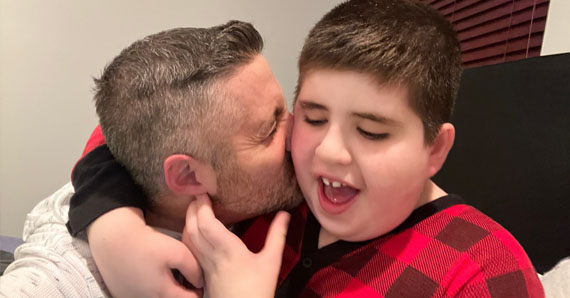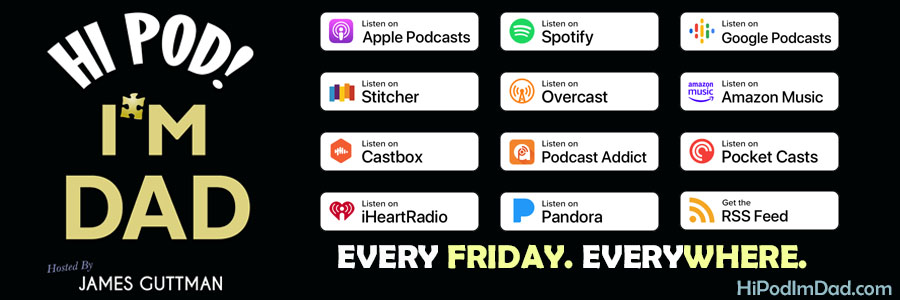Save the over-the-top language for someone else.
It makes us tear our hair out, kills our childhood, and wins the Internet. The strong desire for people to use strong language in order to convey their points today can sometimes cloud the truth.
Rarely, will you see a review that says, “Eh, it was OK.” No. Something is either the greatest thing to ever happen, often generating “all the feels”, or makes one’s eyes bleed. Happy medium is no longer an option in a land of unhappy extremes. Our tastes are all or nothing on everything from our politics to our pizza.
Being the father to a child with autism has shown me just how true that is. The way we talk about our children can often mirror the ways we talk about other things. It’s sometimes the most extreme of them all.
I try not to do that here. Even the positives are grounded in reality. My non-verbal son and I have the most unique relationship I have ever had in my life. That’s a fact. He has his ups. He has his downs. The great times are great. The bad times aren’t so great. The general consensus is that parenting, as a whole, is, well, fine.
There’s a danger to using that type of language and I’ll explain why. I felt it last week when looking at the description for a piece of media sent to me. The story was about a non-verbal boy learning to talk. The copy lost me in the first sentence:
This is the tale of a Family as they attempt to save the life of their non-verbal child who suffers from autism.
Riveting. Was he hanging from the bottom of a 747 flight? Did he accidentally step into the mouth of a giant mountain cat? Did he do some other ridiculous example I can make up that involves danger?
No. He was just non-verbal like my son.

Full disclosure, I don’t have autism. I’m not subject to ableism and the words people say about autism aren’t words about me. I am a father to someone with autism. Their words are about someone I love.
And those words hurt to read.
It hurt me for Lucas who, thankfully, wouldn’t understand the verbiage used there. The heartbreaking thought that someone could think my son is somehow unsaved without language is only matched by the heartbreaking thought that they believe the biggest part of his personality is suffering. Who would say such a thing?
My first thought is that it has to be someone who doesn’t know anything about non-verbal autism, but that’s not the case here. It looked like something that the life-saving family signed off on. I guess no one took a few minutes to realize a few things.
The arrogance to writing or approving words like this is staggering. Having once been in that early-diagnosis haze, I know how desperate many new parents are to elicit language from their struggling children. The memories I had of the dire need to “fix” my child in those early days are still fresh in my mind. I was in a haze for months and couldn’t focus on anything else. All I wanted was to give him a voice in a world that values that sort of thing more than it should.
So what happens when, despite our best efforts, he doesn’t speak? Did I not save him? Have I failed my son? Is that what this means?
When Lucas was little, I used to think that one day, when he grew up, I could just ask him why he doesn’t talk. That would solve the mystery. He didn’t know how to tell me at two, but surely at 12, he could.
Well, Lucas is 12, and the other day that very scenario kind of took place. At two, I didn’t know who he would grow into and my assumptions about his eventual communication skills were somewhat off. He can’t converse in a way that allows me to say, “Yo. Why don’t you talk?” He does, however, have many ways of communicating.
I was putting his shoes on and, as I often do, tried to get him to imitate mouth movements. It has long been an issue, but he always makes the attempt. I make the “H” sound and try to coax a “hi” from him. It doesn’t work.
The effort he makes is real, but fall short of sound. He will open his mouth, lean back, and…cough. Other times he will just squint and stop. He always stops short.
It’s OK, buddy. You’ll do it. You’ll see. Soon you’ll talk.
That’s when I saw his hand down by his waist. With his eyes fixed on me, he was waving his finger back and forth. It’s our gesture for “no, no, no.” I couldn’t believe it. I hadn’t laughed that hard in a long time.
He looked at me with a surprised expression, unprepared for my uproarious response. I hugged him as he giggled and said, “No? We’ll see, pal. We’ll see. You can do anything!”

How could anyone look at that interaction and think that it’s somehow akin to a death? How could it make any sense that my boy needs to say “no” rather than wag his finger to be considered “saved”. Who is talking about our children in such a disrespectful way?
They never met my kid. If they did, they’d know that he doesn’t “suffer” from autism. He doesn’t suffer at all, in fact, because he has the best support system on the planet. It’s this type of language, often spewed out by others, that degrades some of the most wonderful people I have ever met.
The irony is that my son might not have language, but those people do…and look at the dumb ways they use it. Save the over-the-top language for someone else. No one needs saving here. If my boy never utters a word, he’ll have more love in his life than most other people will ever know.
If that’s suffering, sign me up.
READ NEXT:
The Language of Calm: Soothing My Non-Verbal Child
 Every Friday on HIPODIMDAD.COM, Apple, Spotify, Google, Amazon, Stitcher, IHeartRadio, Pandora, Tune-In, Alexa, Podcast Addict, Podchaser, Pocket Casts, Deezer, Listen Notes, and…Everywhere Pods Are Casted.
Every Friday on HIPODIMDAD.COM, Apple, Spotify, Google, Amazon, Stitcher, IHeartRadio, Pandora, Tune-In, Alexa, Podcast Addict, Podchaser, Pocket Casts, Deezer, Listen Notes, and…Everywhere Pods Are Casted.













